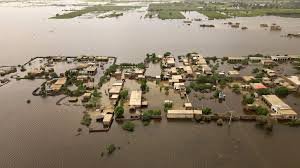Sindh stands on the edge of a major humanitarian and ecological crisis. Forecasts warn that a very high flood at Guddu Barrage between September 6 and 7 will coincide with torrential rains from September 7 to 9. The dangerous overlap of overflowing rivers and heavy monsoon downpours could submerge vast stretches of low-lying districts, aggravating an already fragile situation across the province.
The looming system, originating from India’s Madhya Pradesh, is expected to bring relentless rain across Tharparkar, Umerkot, Mirpurkhas, Hyderabad, Karachi, Sukkur, Larkana, Jacobabad, and beyond. While the Provincial Disaster Management Authority has raised a red flag, past experiences cast doubt on the state’s ability to respond swiftly and effectively. Citizens fear that mismanagement, poor drainage, and fragile infrastructure could turn the rains into another cycle of preventable destruction.
Follow Republic Policy on YouTube
The flow at Guddu Barrage already stands above 337,000 cusecs, raising alarm that a sudden release of water could swamp entire districts. Though officials deny mismanagement, experts warn that holding back water and then releasing it in bulk could magnify devastation. With Karachi and other cities already grappling with inadequate municipal preparedness, the threat of urban flooding looms ominously.
Follow Republic Policy on Twitter
This crisis underscores the structural weaknesses in Pakistan’s disaster governance. Barrages built in the mid-20th century cannot cope with modern climatic extremes. Climate change, rapid urbanization, and institutional lethargy have combined to make Sindh a frontline victim of avoidable suffering. From the deadly floods of 2010 to the catastrophic inundations of 2022, lessons remain unlearned.
Follow Republic Policy on Facebook
Authorities must act decisively—ensuring early evacuations, transparent water management, and coordinated rescue operations. But beyond emergency firefighting, Pakistan needs climate-resilient infrastructure, modern flood management, and accountable governance. Without these reforms, Sindh will continue to oscillate between tragedy and neglect, its people paying the price for systemic failures.
















